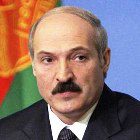
Has Lukashenko given up flirting with the west, asks Olga Birukova
“Lukashenko won. They made a bloody massacre on the Square” my friend texted on the evening of 19 December. Since then I’ve been shocked reading and watching news from Belarus. I don’t know whether the authorities will close the country totally or will try again to flirt with the west as if nothing happened. But it’s a Belarus I haven’t seen so far and it’s not so easy to get used to that idea.
Seven presidential candidates beaten and jailed, 26 journalists detained, 20 more injured. 639 protesters detained, hundreds beaten. The above is one way to briefly describe Belarus’s presidential elections on 19 December. The authorities provided other figures Much less striking figures: 90.65 per cent of population voted — 79.65 per cent of them for President Alexander Lukashenko. The statistics aren’t credible.
At Lukashenko’s first postelection press conference on 20 December he promised to crack down on internet freedom and “put an end to this stupid democracy”. So far he has kept his promise: a huge number of homes and offices have been searched. Equipment has been confiscated from Belarus’s NGOs and the independent media, including EU-funded Belsat, Euroradio, private Nasha Niva and others. The private flats of journalists and activists have been carefully combed.
On 29 December about 300 detainees were released after serving their full 10-day term. Around 300 have longer sentences. They will spend the New Year in prison. Another 26 people are still being held in KGB detention center. Among them are seven presidential candidates and members of their campaign teams, journalists Natalya Radzina (www.charter.97.org), Irina Khalip (from Russian newspaper Novaya Gazeta, she is also wife of Andrei Sannikov, who ran for presidency this year. Nasta Palajanka who is just 20 years old and helps run the opposition “Young Front”. They all are accused of participating and organising mass disorder (article 293 of Belarus Criminal Code). If convicted they face spending up to 15 years in jail.
Strangely, this election result follows a three-year strategy of regime democratisation and the EU’s attempts “to tame monster Lukashenko”.
Even in Belarus, nobody expected such a twist. The ten wannabe presidents enjoyed relative freedom during electoral campaign, without any illusion about their popularity amongst the Belarusian people. But on election night the police used stun grenades and beat severely people during the final cleaning of the Nezalejnasci Square (Independence Square).
The rally was announced widely. After previous elections (2006, 2004) similar events gathered between 5-10,000 people. According my sources at least 15-20,000 people gathered together 19 December. Some reports had the crowd peaking at 40,000. According to Svaboda radio, at around 10pm a group of unknown people — widely believed to be state agents provocateurs — began to smash windows. This was the trigger for the riot police to sweep in. Within an hour central Minsk was fully controlled by the militia and the military.
Why did Lukashenko choose now to give up “democratic decorations”? All Russian and Belarusian language analysis I read asks the same question.
Theories abound, some believe the 19 December operation was planned well in advance and just marked a start of new phase of a dictatorship which doesn’t need masks any more, and no longer cares about how its viewed in the west. According to this theory the goal was to terrify the average citizen in order to prevent future civil protests rest future and, possibly, to freeze developing relations with EU.
Others point out that several huge privatisations of state infrastructure are planned for 2011 in Belarus, giving the current team a incentive to stay in power at any price in order to receive the “benefits”. These theorists point out that to ensure a smooth redistribution Lukashenko will need to ensure both the media and civil movements are muted.
Riot police targeted and fought with media. They smashed cameras, directly attacked and jailed journalists, even those who had international accreditation, which normally serves as a “universal pass” in any situation in any country.
Journalists from Polish Gazeta Wyborcza, France Press, US-funded Liberty radio, Russia’s Novaya Gazeta as well as a number of leading Belarus journalists were detained albeit some very briefly. Correspondents from Associated Press, New York Times, Deutcshe Welle also reported injuries.
And yet, journalists kept working, uploading many frank and shocking reports. I could hardly believe my eyes watching recent video from Belarus. I have never seen before police beating so violently girls collapsed on the ground, while their friends desperately tried to cover their bodies. Bare hands against batons of professionals, bodies on the ground, blood on the snow and broken bones — this is the picture of elections 2010.
Belarusian activists beg the international community not to remain indifferent, they ask: “Will you, please, appeal to your national governments to condemn the actions of Belarusian authorities and TERMINATE ANY RELATIONS with the FASCIST regime in Belarus. Will you, please, address to the Belarusian state authorities and the diplomatic representations in your countries with a demand to release immediately ALL participants of peaceful protest actions in Minsk, including journalists and alternative Presidential candidates and to STOP repression in relation to the people that do not support the incumbent regime in Belarus. It is only COMMON EFFORTS that can improve the situation in Belarus”, reads a letter circulated on the web.
Will you?
Olga Birukova is a Belarusian journalist based in London





